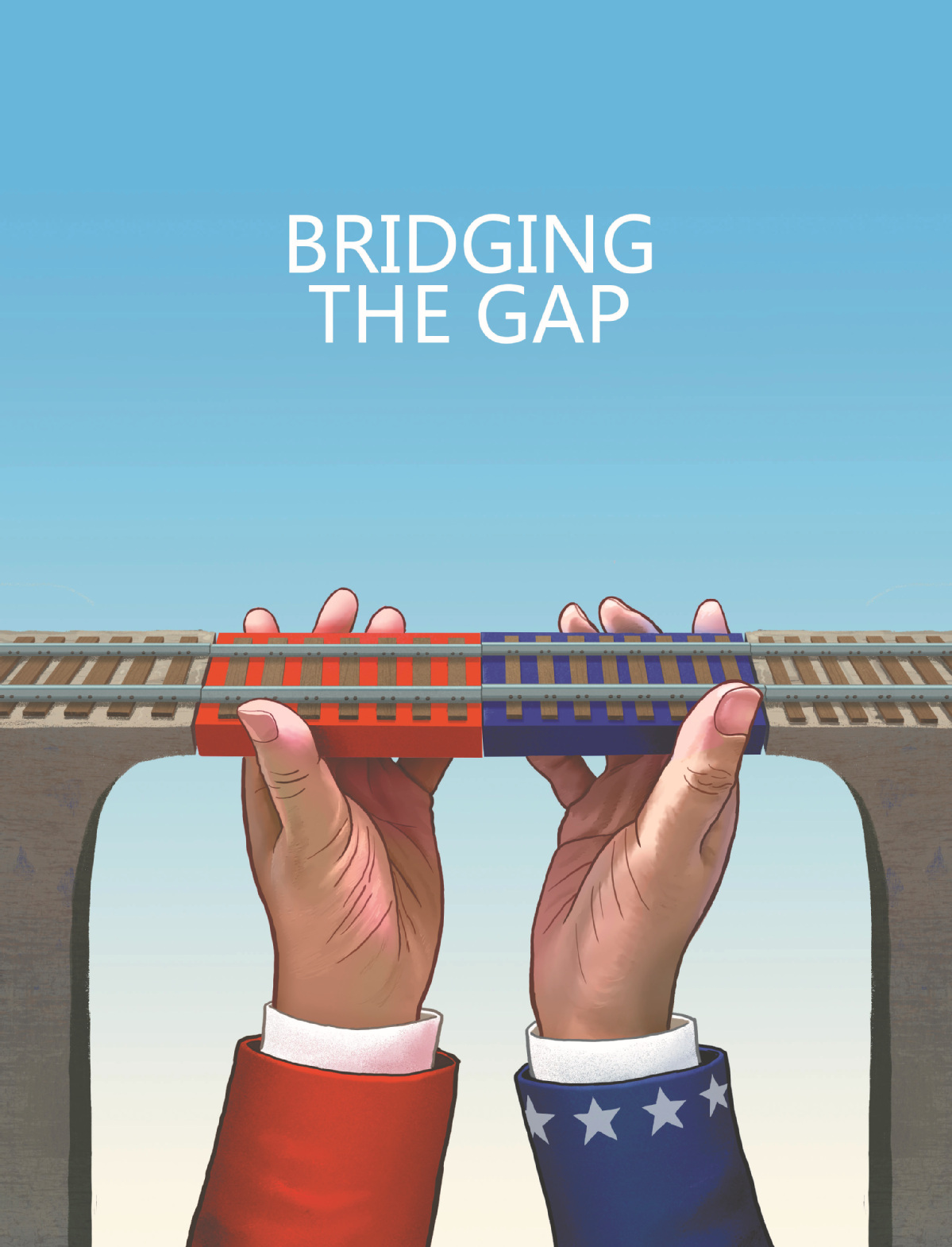US attempts to contain China doomed

LUO JIE/CHINA DAILY
Washington's actions fail to have the intended effect
Asked in Washington last month whether the United States is urging China to isolate Russia after Moscow launched its "demilitarization and denazification operation" in Ukraine, US President Joe Biden said, "I am not prepared to comment on that at the moment."
That response is in sharp contrast with his straightforwardness in talking about other issues related to the Ukraine crisis, which his administration has paralleled with the Taiwan question as a flashpoint, highlighting the sensitivity and complexity of China-US relations.
Some observers speculate that the Ukraine crisis may prompt the Biden administration to avoid further escalating tensions with China to avoid confronting two powers on two fronts at the same time. Biden mentioned China only twice, both in economic terms, in his first State of the Union address on March 1, while he mentioned Russia 18 times.
China also has plenty to consider as a result of the conflict between Russia and Ukraine.
Sino-US relations could enjoy a rebound or worsen, as bipartisan opposition to Russia has surged higher than that to China for the time being, and there may be a window of opportunity to reset ties between Washington and Beijing.
Although Beijing has said there is no ceiling to its cooperation with Moscow, their approaches to addressing international concerns are different.
What is clear is that relations between the US, China, Russia and the European Union are at a crossroads.
The US' Indo-Pacific Strategy, unveiled by the Biden administration on Feb 11 shortly before Russia began its military operation in Ukraine, highlighted US policymakers' resolve to contain China.
However, anyone looking at the strategy can see that it will probably meet the same fate as other endeavors made by the US to this end-from the trade war it has waged against China to its bid to promote the world's economic decoupling from China. This is because none of these initiatives is limited to the two countries alone, but also calls for other nations to back the US endeavors.
Over the past four years, the US economy has grown by 7.3 percent, while China's has expanded by 25.1 percent. Since the novel coronavirus outbreak emerged in late 2019, the Chinese economy has grown by 10.5 percent, and the US' by 2.1 percent.
Last year, China's foreign trade increased by 21.4 percent. Its trade with all major partners, including the US, grew dramatically. The US trade deficit with China rose to $1.1 trillion from $790 billion in 2017, before Washington started the trade war to reduce the shortfall.
This means that neither has China's development been contained, nor has it been isolated from the rest of the world, despite the great lengths the US has gone to in that regard.
As the world's largest growth engine, goods trader, foreign investment destination and manufacturing base, and with the most promising consumption market, service trade and global innovation, China's status in the world economy and its role in global supply chains have never been gifts of the US, but the comprehensive effects of numerous economic factors.
Increase awareness
So actions taken by the US to contain China have not produced the intended effect. Instead, they have prompted China to become more aware of the urgent need to realize self-sufficiency in core technologies.
Some US politicians engineering their nation's anti-China policy stooped to new lows to smear the Beijing 2022 Winter Olympics. Such action is in sharp contrast with the popularity the Games enjoyed in the US, where the advertising revenue of NBC, the US Winter Olympics broadcaster, hit a record high. US participants also praised the event.
Susanne Lyons, chair of the US Olympic and Paralympic Committee board of directors, congratulated the Games' organizing committee. She said the facilities and services at the Winter Olympics were impressive and that US athletes were satisfied with them.
Some US athletes taking part in Beijing 2022 marveled at the wide difference between the China they experienced and the China portrayed by US politicians and media.
There is no doubt that Washington's China policy is to some extent also divorced from sentiment in the US business community. A number of petitions have been raised urging the administrations of former US president Donald Trump and Biden to lift tariffs on Chinese imports, with US consumers paying the price for these punitive duties.
Divisive partisan politics in the US, along with the country's 40-year-high inflation, 25-year-high crime rate, and the death toll from COVID-19 are spurring US politicians to source the cause of these problems to China. There are also other chronic social issues, ranging from racial discrimination to the widening income gap in the US.
Edelman's Global Trust Barometer 2022 indicates that 91 percent of Chinese people who were surveyed trust their government, up by 9 percentage points year-on-year, ranking first among 27 surveyed countries. Trust in the US government by that nation's citizens who were surveyed was just 39 percent, down 5 percentage points from a year ago.
Sourabh Gupta, a senior fellow at the Institute for China-America Studies in Washington, said the US is displaying a curious mix of arrogance and paranoia.
It is showing arrogance because US politicians believe that their country represents the end of history, and paranoia because they are aware that the US' geopolitical dominance in the international system is declining.
Gupta said, "A 'China Derangement Syndrome' is setting in within Washington, where opinion on Beijing runs the gamut from the hysterical to the farcical, but is only occasionally objective."
The Biden administration has said it views China as a competitor, a rival and a partner. Such a stance makes it evident that Sino-US relations cannot return to how they were and that a new framework for these relations must be found as soon as possible to effectively manage risks, provide communication channels and build platforms to advance cooperation.
Although the two countries generally agree on this, the US intends the framework to be built according to its rules, while China insists the rules of engagement should be drawn up together.
This is why some observers argue that the focus of this contention is on the rules for the future.
US elites worry about the West losing its exalted position to the East, while China wants the two to interact based on mutual respect, equity and win-win cooperation.
Statistics indicate that Asian countries' total GDP has surpassed that of North America and Europe. Projections show that in terms of purchasing power the top five economies by 2050 will be China, India, the US, Indonesia and Brazil.
Kishore Mahbubani, a Singaporean researcher of politics, said the rise of non-Western countries is a fait accompli, and history shows the rulemaking power, if not the center of gravity of knowledge, will follow the transfer of economic power from the West to the East.
In a speech in 2019, Kiron Skinner, the then US State Department director of policy planning, highlighted another aspect of Washington's policy toward Beijing, saying that for the first time the US has a "great power competitor that is not Caucasian".
She said: "When we think about the Soviet Union in that competition (the Cold War), in a way, it was a fight within the Western family. This is a fight with a really different civilization and a different ideology, and the United States hasn't had that before."
However, the comparative decline of the US does not mean the East will simply replace the West. The challenges facing humanity as a whole mean that the future world must be united.
China's proposal that countries work together to build a community with a shared future for humankind is the right direction for the world to take.
S. Mahmud Ali, associate fellow at the Institute of China Studies at the University of Malaya and author of a seven-volume series on Sino-US relations, said the COVID-19 pandemic has clearly shown the need for countries with different political, ideological and economic systems to work together.
"The virus does not care about political borders, and climate change doesn't care about political parties. Only with everyone working together can these challenges be addressed effectively," Ali said.
Power politics and the law of the jungle upheld by the US are insufficient to protect its interests. Instead, they harm these interests by plunging the world into endless conflicts, Ali added.
Qin Yaqing, a professor of international politics and former president of China Foreign Affairs University, attributed the souring of Sino-US relations to the US re-embracing power politics. This was caused by China's fast rise and means that the US started to define national interests in an exclusive way and to classify countries according to ideological differences. Qin said countries must define their national interests in a more communal way.
"The baseline common interest of China and the US is to maintain peace and stability of the world order," Qin added.
He Yafei, former vice-minister of foreign affairs, said the complexity of Sino-US relations and the US' strategic anxiety will undoubtedly test the wisdom and determination of the two nations in advancing their relations.
"The two countries should face the anxiety of change calmly," He said.
Basically, competition between the US and China is a test of which can do a better job in contributing to the necessary adjustment to make the global governance system inclusive and fair.
Sven Biscop, director of the Europe in the World Program at the Egmont-Royal Institute for International Relations, a think tank in Brussels, said the real challenge is to maintain "one world"-a single set of rules to which all great powers subscribe-because that creates the stability they need to peacefully pursue their economic interests.
He stressed, "This can only happen if all powers refrain from interfering in other states' domestic affairs."
The way in which the Russia-Ukraine crisis has unfolded, especially the extent of US-led sanctions against Russia, has reminded Beijing that the West still dominates the main arteries of the world system and that the US' enormous resilience should not be ignored.
Fairer system
Ali, from the University of Malaya, said, "Leaders emerge and come up with solutions that no one imagined."
China has no intention of challenging the postwar system established by the West, but it does want the system to be fairer. The US should demonstrate more perceptiveness and confidence so that it can recognize that there are essential differences between its competition with China and its Cold War confrontation with the Soviet Union, Ali added.
As a major growth driver, poverty reducer and sustainable development promoter, China can be a key contributor to a world system built on the rule of law and free trade, which would also benefit the US.
Biscop said the US is still seeking its way in a multipolar world in which it is no longer the undisputed "number one".
"The US' strategy toward the other great powers is still being shaped. Some Americans seem to think that the strategic objective should be to 'make China weak again'-but China, and Russia, will remain great powers, so that is an unrealistic objective that can only lead to a never-ending rivalry," he added.
Gupta, from the Institute for China-America Studies, said the US and its allies and partners need to co-exist with China in the Asia-Pacific region and the world. They need to obey the system of international law, which the US itself played a leading role in crafting.
The wide attention paid globally last month to the 50th anniversary of US President Richard Nixon's epoch-making visit to China speaks volumes for worldwide expectations that the two countries can draw on historical experience to break the deadlock in their relations.
Regretfully, the Biden administration, by sending a high-profile delegation to Taiwan on the anniversary to show its commitment to the island's security, showed the US is not yet ready to meet those expectations.
Yet, as was the case 50 years ago, the common interests of China and Russia far outweigh their differences. Those interests include a common responsibility to strive for a better world.
Photos
Related Stories
Copyright © 2022 People's Daily Online. All Rights Reserved.










